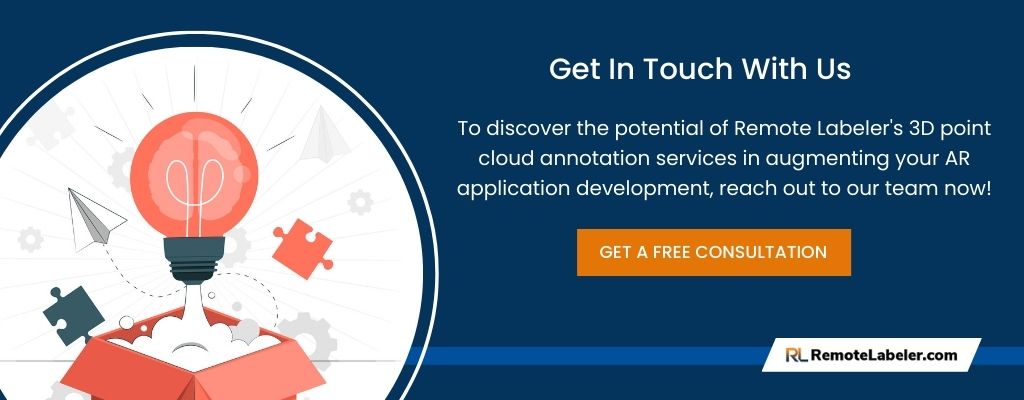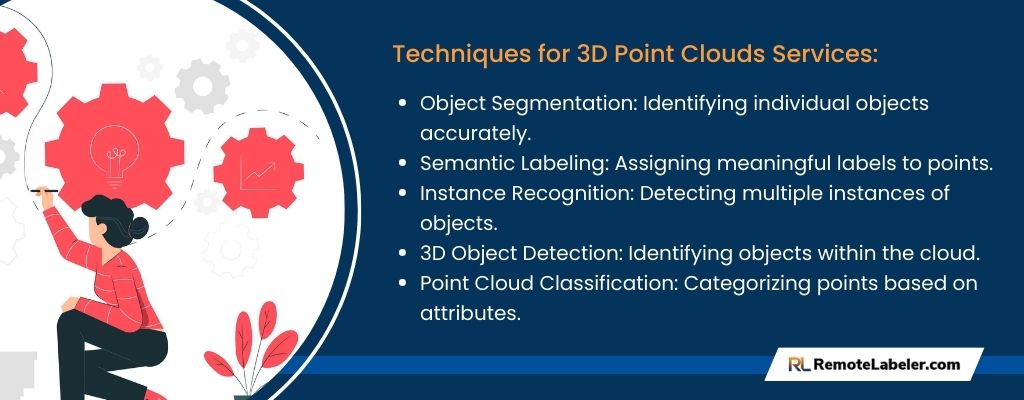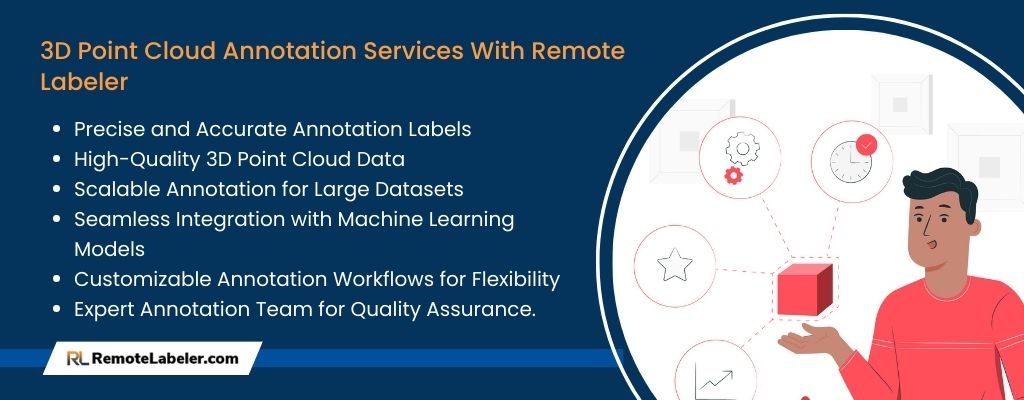In the ever-evolving landscape of augmented reality (AR) applications, the crucial role of 3D point cloud annotation services cannot be overstated. As AR technologies advance and become more integral to various industries, the demand for accurate and comprehensive data labelling outsourcing services has surged. This growing need stems from the essential requirement to make sense of raw point cloud data and equip machines and AI systems with the ability to perceive and comprehend the world around them.
In this context, 3D point cloud annotation emerges as the pivotal process that infuses point cloud data with vital metadata, enabling seamless integration of real and virtual environments. By offering clear and structured insights into the surrounding world, these annotated 3D point clouds form the bedrock for training and validating deep learning algorithms, which lie at the heart of numerous AR applications.
In this article, we will explore the concept of 3D point cloud annotation, its relevance in AR applications and the importance of high-quality annotation services.
What Are 3D Point Cloud Annotation Services?
Point cloud annotation services are a crucial component of the data labeling process, specifically designed for 3D data in the form of point clouds. Point clouds are sets of data points in a 3D coordinate system, representing the surface of objects or the environment captured by various sensors like LiDAR (Light Detection and Ranging) or depth cameras. These data points lack inherent structure and require annotation to add meaningful information for machine learning and computer vision algorithms.
In the context of augmented reality (AR) applications, 3D point cloud annotation services are essential for transforming raw point cloud data into semantically labeled information, enabling AR devices to recognize, understand, and interact with the real world. The process involves skilled technicians and specialized tools to accurately annotate the data points, providing context and object information to the underlying AI algorithms. Below are the key aspects of 3D point cloud annotation services:

- Labeling Objects: One of the primary tasks in 3D point cloud annotation is labeling objects in the environment. This includes identifying and classifying various objects, such as cars, pedestrians, buildings, trees, and other elements present in the point cloud data. By associating each data point with its corresponding object label, AR applications can recognize and interact with these objects in real-time.
- Semantic Segmentation: Semantic segmentation is a technique used to divide the point cloud into meaningful regions or segments. Each segment corresponds to a specific object or part of the environment. The goal is to group together data points that belong to the same object, enabling AR devices to distinguish between different entities and understand the spatial layout of the scene.
- Deep Learning Training Data: Annotated 3D point cloud data serves as the training set for deep learning algorithms used in AR applications. These algorithms, such as deep neural networks, learn from the labeled data to make accurate predictions and decisions. High-quality annotations are critical for training these algorithms effectively, ensuring reliable performance in real-world AR scenarios.
- Accuracy and Precision: The accuracy and precision of 3D point cloud annotation are paramount. Even small errors in labeling can lead to significant issues in AR applications, such as misidentifying objects or misplacing digital overlays. Skilled technicians, equipped with domain knowledge, utilize sophisticated tools to achieve precise annotations, minimizing errors and maximizing the effectiveness of AR systems.
- Real-time Interaction: AR applications require real-time interactions with the environment. Well-annotated 3D point clouds enable AR devices to overlay digital information seamlessly onto the physical world, creating immersive and interactive experiences for users.
- Safety in Autonomous Vehicles: Apart from AR applications, 3D point cloud annotation services play a vital role in the development of autonomous vehicles. Annotated point cloud data helps autonomous vehicles perceive and understand their surroundings accurately, ensuring safe navigation and object recognition.
- Scalability and Efficiency: With the growing demand for AR applications and autonomous vehicles, the scalability and efficiency of point cloud annotation services become crucial. Specialized annotation companies, like Remote Labeler, offer the expertise, infrastructure, and resources to handle large-scale 3D annotation projects efficiently.
Data Annotation Techniques for 3D Point Clouds Services
Data annotation techniques for 3D point clouds services are at the forefront of enabling augmented reality (AR) applications to bridge the gap between the virtual and physical worlds. As AR becomes increasingly integrated into various industries, the need for accurate and comprehensive annotations of 3D point cloud data has become paramount. These techniques involve the meticulous process of adding metadata to raw point cloud data, imparting crucial contextual information to objects and elements in the environment. Through the careful application of various annotation methods, such as 3D object recognition point cloud annotation, 3D point cloud semantic segmentation, and deep learning 3D point cloud annotation, AR devices gain the ability to perceive, interact, and understand their surroundings with remarkable precision and efficiency. By delving into these data annotation techniques, we can better appreciate their significance and impact on the evolution of augmented reality applications.

3D Object Recognition Point Cloud Annotation
3D object recognition point cloud annotation focuses on identifying and labeling objects within the point cloud data. This technique enables AR devices to recognize and interact with various objects in the real world accurately. By training deep learning models with annotated data, the AR applications can perform robust object recognition and tracking, enhancing user experience and safety.
3D Point Cloud Semantic Segmentation
Semantic segmentation involves assigning semantic labels to each point in a point cloud, thereby segmenting the scene into meaningful parts. For AR applications, this technique is vital as it allows devices to understand the spatial context and relationships between different objects. Accurate semantic segmentation through annotation empowers AR devices to make informed decisions and interactions in real-time.
Deep Learning 3D Point Cloud Annotation
Deep learning requires vast amounts of annotated data for training. This annotation technique involves generating large-scale, precise, and diverse annotated 3D point cloud datasets to train deep learning models effectively. The process demands technical expertise and an understanding of the intricacies of deep learning algorithms to ensure optimal performance in AR applications.
The Importance of High-Quality Annotation Services for Augmented Reality
In the rapidly evolving landscape of augmented reality (AR), high-quality annotation services play a pivotal role in shaping the success and adoption of AR applications. Augmented reality is all about merging digital content seamlessly with the real world, creating immersive and interactive experiences.
However, for AR devices to function effectively, they rely heavily on accurately annotated 3D point cloud data. Each element in the environment must be precisely labeled and identified to ensure that the AR device can understand and interact intelligently with its surroundings. The quality of these annotations directly impacts the functionality, safety, and user experience of AR applications, making reliable and precise 3D point cloud annotation services absolutely indispensable.
Accurate AR Functionality
The accuracy and precision of 3D point cloud annotations are directly linked to the seamless functionality of AR applications. With high-quality annotations, AR devices can confidently perceive and interpret the real world, accurately identifying and locating objects, surfaces, and structures. This, in turn, enables AR applications to overlay digital content with utmost precision, creating realistic and immersive experiences for users.
Safety and Reliability in Autonomous Vehicles
In the realm of autonomous vehicles and autonomous vehicle data collection, data annotation plays a critical role in ensuring safety and reliability. With AR being an integral part of autonomous vehicle navigation, precise 3D point cloud annotations are essential for the vehicle’s perception systems. Accurate annotations, obtained through autonomous vehicle data collection, allow autonomous vehicles to detect and avoid obstacles, recognize traffic signs, and make informed decisions in real-time, ensuring the safety of passengers and pedestrians alike.
Enhanced User Experience
At the heart of every successful AR application lies an exceptional user experience. High-quality 3D point cloud annotations enable AR devices to understand the spatial context of the user’s environment, facilitating seamless interactions between the digital and physical worlds. Users can enjoy intuitive and natural interactions with AR content, fostering a deeper sense of engagement and satisfaction.
Investing in top-tier 3D point cloud annotation services guarantees optimal AR functionality, enhanced safety in autonomous vehicles, and unparalleled user experiences, ultimately shaping the future of augmented reality.
Introducing Remote Labeler for 3D Point Cloud Annotation Services
When it comes to harnessing the full potential of augmented reality (AR) applications, precise and reliable 3D point cloud annotation services are of paramount importance. This is where Remote Labeler, a leading provider of data labeling outsourcing, emerges as a key player in the industry. With a strong commitment to excellence and a team of technical experts and domain specialists, Remote Labeler is dedicated to delivering top-tier 3D point cloud annotation services that cater to the unique needs of AR development.

What sets Remote Labeler apart?
- Technical Expertise: Remote Labeler boasts a team of skilled professionals well-versed in the complexities of 3D point cloud annotation and deep learning techniques. Their technical expertise allows them to produce meticulously labeled datasets, ensuring optimal performance of AR applications powered by deep learning algorithms.
- Precision and Quality: Remote Labeler places a strong emphasis on accuracy and quality in every annotation project. Their rigorous quality control measures guarantee that each point in the 3D point cloud data is labeled with precision, resulting in reliable training data for AR systems.
- Versatility in Annotation Techniques: Whether it’s 3D object recognition point cloud annotation, 3D point cloud semantic segmentation, or deep learning 3D point cloud annotation, Remote Labeler possesses the knowledge and capabilities to cater to a diverse range of annotation needs.
- Customized Solutions: Understanding that each AR application has unique requirements, Remote Labeler offers customized annotation solutions to meet the specific demands of individual projects. This flexibility ensures that clients receive annotations tailored to their precise needs.
By partnering with Remote Labeler, businesses and developers gain access to an invaluable resource for high-quality 3D point cloud annotation services. Whether it’s for enhancing AR functionality, enabling safer autonomous vehicles, or providing exceptional user experiences, Remote Labeler stands ready to support and elevate the development of cutting-edge AR applications.
Remote Labeler’s commitment to excellence, technical acumen, and dedication to customer satisfaction make them the ideal choice for businesses seeking dependable and accurate 3D point cloud annotation services. Embrace the power of precise annotations and unlock the true potential of augmented reality with Remote Labeler as your trusted partner.
Conclusion
In conclusion, 3D point cloud annotation services are an indispensable aspect of augmented reality applications. The accuracy and precision of these annotations directly impact the performance, safety, and user experience of AR devices. Leveraging data annotation techniques such as 3D object recognition point cloud annotation, 3D point cloud semantic segmentation, and deep learning 3D point cloud annotation are critical for developing robust AR systems.
As the demand for high-quality 3D annotation services continues to grow, Remote Labeler stands out as a dependable partner. Their technical expertise and commitment to excellence make them the ideal choice for businesses seeking top-tier 3D point cloud annotation services. Embrace the power of accurate 3D point cloud annotation with Remote Labeler and unlock the true potential of augmented reality.
To explore how Remote Labeler can enhance your AR application development with its top-notch 3D point cloud annotation services, get in touch with our team today!
- Emerging Trends and Future Outlook: The Data Labeling Industry in 2024-2030 - December 8, 2023
- Landmark Annotation: Key Points - November 6, 2023
- All You Should Know About Bounding Box Annotation - November 5, 2023